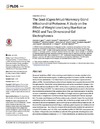Identificador persistente para citar o vincular este elemento:
https://accedacris.ulpgc.es/jspui/handle/10553/52552
| Título: | The goat (Capra hircus) mammary gland mitochondrial proteome: A study on the effect of weight loss using blue-native page and two-dimensional gel electrophoresis | Autores/as: | Cugno, G. Parreira, J.R. Ferlizza, E. Hernández Castellano, Lorenzo Enrique Carneiro, M. Renaut, J. Castro, Noemi Arguello, Anastasio Capote, J. Campos, A.M.O. Almeida, A.M. |
Clasificación UNESCO: | 3109 Ciencias veterinarias | Palabras clave: | Australian Merino Lambs Genetic-Resources Animal Production Milk-Production Guinea-Bissau, et al. |
Fecha de publicación: | 2016 | Editor/a: | 1932-6203 | Publicación seriada: | PLoS ONE | Resumen: | Seasonal weight loss (SWL) is the most important limitation to animal production in the Tropical and Mediterranean regions, conditioning producer's incomes and the nutritional status of rural communities. It is of importance to produce strategies to oppose adverse effects of SWL. Breeds that have evolved in harsh climates have acquired tolerance to SWL through selection. Most of the factors determining such ability are related to changes in biochemical pathways as affected by SWL. In this study, a gel based proteomics strategy (BN: Blue-Native Page and 2DE: Two-dimensional gel electrophoresis) was used to characterize the mitochondrial proteome of the secretory tissue of the goat mammary gland. In addition, we have conducted an investigation of the effects of weight loss in two goat breeds with different levels of adaptation to nutritional stress: Majorera (tolerant) and Palmera (susceptible). The study used Majorera and Palmera dairy goats, divided in 4 sets, 2 for each breed: underfed group fed on wheat straw (restricted diet, so their body weight would be 15-20% reduced by the end of experiment), and a control group fed with an energy-balanced diet. At the end of the experimental period (22 days), mammary gland biopsies were obtained for all experimental groups. The proteomic analysis of the mitochondria enabled the resolution of a total of 277 proteins, and 148 (53%) were identified by MALDI-TOF/TOF mass spectrometry. Some of the proteins were identified as subunits of the glutamate dehydrogenase complex and the respiratory complexes I, II, IV, V from mitochondria, as well as numerous other proteins with functions in: metabolism, development, localization, cellular organization and biogenesis, biological regulation, response to stimulus, among others, that were mapped in both BN and 2DE gels. The comparative proteomics analysis enabled the identification of several proteins: NADH-ubiquinone oxidoreductase 75 kDa subunit and lamin B1 mitochondrial (up-regulated in the Palmera breed), Guanine nucleotide-binding protein G(I)/G(S)/G (T) subunit beta-2 (up-regulated in the Majorera breed) and cytochrome b-c1 complex subunit 1, mitochondrial and Chain D, Bovine F1-C8 Sub-Complex Of Atp Synthase (downregulated in the Majorera breed) as a consequence of weight loss. | URI: | https://accedacris.ulpgc.es/handle/10553/52552 | ISSN: | 1932-6203 | DOI: | 10.1371/journal.pone.0151599 | Fuente: | Plos One[ISSN 1932-6203],v. 11 (3) |
| Colección: | Artículos |
Citas SCOPUSTM
22
actualizado el 08-jun-2025
Citas de WEB OF SCIENCETM
Citations
16
actualizado el 08-feb-2026
Visitas
63
actualizado el 10-ene-2026
Descargas
76
actualizado el 10-ene-2026
Google ScholarTM
Verifica
Altmetric
Comparte
Exporta metadatos
Los elementos en ULPGC accedaCRIS están protegidos por derechos de autor con todos los derechos reservados, a menos que se indique lo contrario.
